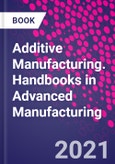Additive Manufacturing explains the background theory, working principles, technical specifications, and latest developments in a wide range of additive manufacturing techniques. Topics addressed include treatments of manufactured parts, surface characterization, and the effects of surface treatments on mechanical behavior. Many different perspectives are covered, including design aspects, technologies, materials and sustainability. Experts in both academia and industry contribute to this comprehensive guide, combining theoretical developments with practical improvements from R&D. This unique guide allows readers to compare the characteristics of different processes, understand how they work, and provide parameters for their effective implementation.
This book is part of a four-volume set entitled Handbooks in Advanced Manufacturing. Other titles in the set include Advanced Machining and Finishing, Advanced Welding and Deformation, and Sustainable Manufacturing Processes.
Please Note: This is an On Demand product, delivery may take up to 11 working days after payment has been received.
Table of Contents
1. Introduction to Additive Manufacturing
2. Introduction to Powder Bed Fusion of Polymers
3. Selective Laser Melting: Principles and Surface Quality
4. Laser Directed Energy Deposition. Principles and Applications
5. Vat Photopolymerization Methods in Additive Manufacturing
6. Polymer and Composites Additive Manufacturing: Material Extrusion Processes
7. Introduction to Fused Deposition Modeling
8. Electron Beam Melting Process: A General Overview
9. Introduction to 4D Printing: Methodologies and Materials
10. Laser polishing of Additively Manufactured parts
11. On Surface Quality of Engineered Parts Manufactured by Additive Manufacturing and Post Finishing by Machining
12. Standards for Additive Manufacturing Technologies: Structure and Impact
13. Metal Matrix Composites Processed by Laser Additive Manufacturing: Microstructure and Properties
14. Laser Aided Metal Additive Manufacturing and Post Processing: A Comprehensive Review
15. Nano-functionalized 3D Printing
16. Additive Manufacturing for the Automotive Industry
17. Additive Manufacturing of Large Parts
18. 3D printing of Pharmaceutical Products
19. 3D Bioprinting: A Step Forward in Creating Engineered Human Tissues and Organs
20. Additive Processing of Biopolymers for Medical Applications
21. Additive Manufacturing using Space Resources
22. Modelling and Simulation of Additive Manufacturing Processes with Metallic Powders ? Potentials and Limitations Demonstrated on Application Examples








